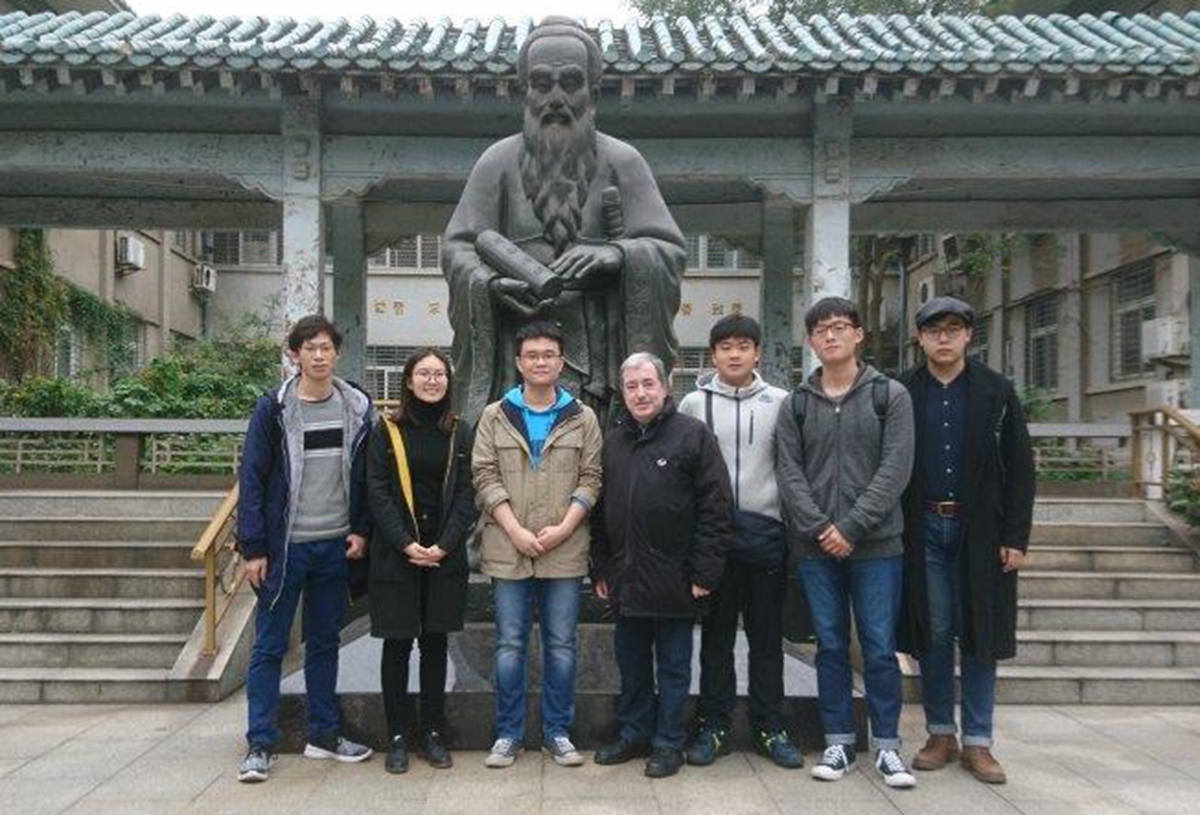
Professor Stelios Virvidakis (center) with his students at Wuhan University in 2017 Photo: Courtesy of Virvidakis

Professor Stelios Virvidakis of the University of Athens Photo: Courtesy of Virvidakis
What spark could the two ancient civilizations of China and Greece have in common? What essence does the vision of building a global community with a shared future draw from the communications of the two ancient civilizations?
The recent exchange of letters has reminded people about the commonality of the two ancient civilizations of China and Greece - harmonious coexistence, which provides important spiritual guidance for mankind to solve the problems of the current times.
A contemporary blend of two civilizations
Chinese President Xi Jinping has replied to a letter from Professor Stelios Virvidakis, president of the Steering Committee of the Center of Greek and Chinese Ancient Civilizations, and four other Greek scholars at the National and Kapodistrian University of Athens (NKUA) recently, extending congratulations over the establishment of the center, the Xinhua News Agency reported on February 21.
Hailing the long history of the Chinese civilization and profound influence of the ancient Greek civilization, Xi said in the letter that more than 2,000 years ago, the two civilizations shone brightly on the two ends of the Eurasian continent, jointly making a fundamental contribution to the evolution of human civilization.
Earlier, five Greek scholars, including Professor Virvidakis, wrote a joint letter to Xi, in which they expressed in great length their high recognition of the concept of civilization advocated by Xi and introduced preparations and development plans of the center.
The Greek scholars were impressed by Xi's great attention to the exchanges between the civilizations, which shows China's open and inclusive attitude toward different cultures.
During President Xi's state visit to Greece in 2019, he and the Greek leaders jointly advocated exchanges and mutual learning between civilizations. After Xi's visit, the two sides actively implemented the consensus of the leaders and made preparations for the establishment of the Center of Chinese and Greek Ancient Civilizations, according to Xinhua.
On February 20, the center was officially inaugurated at NKUA. Partnering with the Center of Chinese and Greek Ancient Civilizations of the Southwest University in China, the newly opened institute aims to promote bilateral exchanges of scholars and students to advance the study of the two civilizations.
Now, it is of great historical and contemporary significance for the two countries to establish the center, which is committed to promoting exchanges and mutual learning between the two civilizations and promoting the development of civilizations of various countries, said Xi in the letter.
Xi said he believes that the center will certainly make a great contribution in this regard.
"We had access to certain texts written by President Xi and we knew that he is really interested in the promotion of the study of ancient civilizations, especially history and archaeology," Virvidakis recalled to the Global Times recently. "Moreover, when he visited Greece a few years ago he expressed his respect and admiration for Greek culture. So we decided to write him a letter."
Virvidakis said that they wanted to draw President Xi's attention to the fact that a center with similar goals and an analogous structure was going to be set up in China's Southwest University, in their hope to get more support from Xi.
"We share the president's conviction that the legacy of both Greek and Chinese civilizations, which, during their long history, have influenced many other cultures and civilizations in Europe, Asia, and in the rest of the world, and can once more provide spiritual guidance, helping us deal with the serious problems humanity is facing in an era of modernization. We trust that he is going to be on our side as we try to pursue our ambitious projects," Virvidakis told the Global Times.
Xi stressed in his reply letter that in the long course of human history, various nations have created civilizations with their own characteristics and symbols, which jointly form a colorful garden of human civilizations.
Reinvigorate philosophy of inclusiveness
Civilizations are the rich accumulation of the historical exploration and also an underlying guide to the survival and development of the nations, Xi said in the letter.
In order to promote the development of human society and jointly build a global community of shared future, we must deeply understand and grasp the ages-old origins and rich contents of different civilizations and let the essence of all civilizations benefit the present generation and all mankind, Xi said.
Xi pointed out that people can know the present by making references to the past and they often carry forward the undertakings of the predecessors to open up a new path for the future.
Virvidakis contended that in both Chinese and Greek philosophy, there was not just a theoretical enterprise aiming at knowledge, but a comprehensive way of life guiding people's behavior.
"Drawing on these common elements we could aspire to reinvigorate contemporary philosophy, which has become too technical and scholastic, and perhaps propose humanistic values for what President Xi describes as a 'global community of a shared future' that could serve as a kind of cultural model for mankind as a whole," Virvidakis noted.
History has amply proven that human civilization can continue to thrive and prosper by sticking to inclusiveness and openness, the Chinese president said.
The world today is undergoing profound changes unseen in a century, Xi said, adding that to solve outstanding contradictions and problems facing the mankind, it is necessary to rely on material means to overcome difficulties and rely on the strength of the spirit to rectify mind through thinking with sincerity.
Virvidakis said they felt "particularly honored, moved, and happy to receive Xi's congratulatory letter which showed that he recognized the importance of the values we wanted to promote."
"We know how busy the president is and we couldn't be sure that he would find the time to send us a reply," Virvidakis noted.
China and the ancient Greece are among the world's most important cradles for human civilizations. More than 2,000 years ago, the two ancient civilizations still had some indirect exchanges despite being separated by the vast Eurasian landmass. The ancient Greek people even had a name for the Chinese at that time: Seres, which means the silk-people. Today, thanks to the joint efforts of the leaders and scholars of both countries, this bond is being passed on through the center and more interactions in the future.
Virvidakis revealed that the new center will conduct rich exchange programs in the near future. For example, the NKUA will lead the way in exchanges that will allow mutual academic visits of Chinese and Greek scholars.
Moreover, Aristotle University of Thessaliniki, the biggest university in Northern Greece, will organize a conference on issues related to the study of the two philosophical traditions, as well as a series of lectures on the reception of Chinese thought in Europe in the modern era, to further build a cultural bridge.
Virvidakis told the Global Times that they intend to attract young people to participate in activities initiated by the center, and the friendship between China and Greek would be the basis for mutual understanding and further collaboration.
"They could thus serve as a cultural bridge between the two nations. I have traveled to many places in China and have been impressed not only by the intelligence and the quality of education received by most students, but also by their enthusiasm to know more about the Greek tradition which they admire," he said. "There should be more and more exchanges and visits by members of the younger generations in the two countries."



